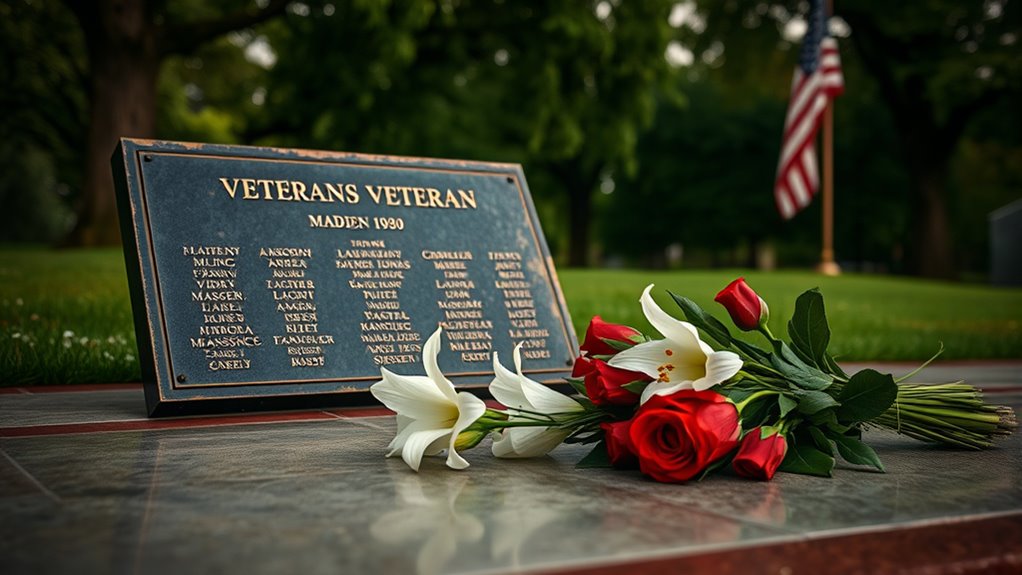Dependency and Indemnity Compensation (DIC) is a tax-free benefit the VA provides to survivors of service members and veterans who died from service-connected conditions. If you’re a surviving spouse or dependent, you may qualify for monthly payments based on the veteran’s service. Eligibility depends on factors like marriage date and connection to the veteran’s service. To learn how to maximize your benefits, continue exploring the details that can support your claim and secure your financial future.
Key Takeaways
- DIC is a tax-free benefit for survivors of veterans who died from service-connected conditions.
- Eligibility requires a legal marriage to the veteran at death or specific circumstances like a short marriage or in-service death.
- Benefits are calculated based on the veteran’s service-connected disability rating and can include additional compensation for dependents.
- Proper documentation such as marriage and death certificates is essential for processing the claim.
- Survivors may also access additional benefits like pensions and health care through VA programs.

Are you wondering how surviving family members can receive financial support after a veteran’s death? If so, understanding Dependency and Indemnity Compensation (DIC) is essential. DIC is a tax-free benefit provided by the VA to eligible survivors of service members and veterans who died from service-connected conditions. One of the first things to determine is spouse eligibility. Typically, your spouse qualifies if you’re legally married to the veteran at the time of their death, and the death was service-related. If you were married for at least one year before the veteran’s passing or if you have a child together, your eligibility is usually straightforward. However, the VA also considers situations where the marriage was less than a year, or if you’re the surviving spouse of a veteran who died in the line of duty, regardless of marriage duration. Additionally, if your marriage ended due to divorce, you might still qualify if you remarry your deceased spouse or meet other specific criteria.
Once eligibility is established, the next step is understanding how the benefit is calculated. The VA considers several factors, including the veteran’s service-connected disability rating and whether the death was directly linked to service. The base amount for DIC is adjusted periodically but generally provides a substantial monthly payment. The calculation also factors in whether the surviving spouse has dependent children, which can increase the benefit amount. If you’re the surviving spouse and have dependent children, you could receive additional compensation for each child. The VA also considers whether you’re eligible for other benefits or have special circumstances, like being a surviving spouse of a veteran who was totally disabled at the time of death. The benefit calculation aims to offer financial support that reflects the veteran’s service and the survivor’s needs, ensuring that families are not left struggling after such a loss. Additionally, understanding benefit eligibility criteria can help you better navigate the application process and ensure you receive all entitled support.
Understanding these eligibility criteria and how benefits are calculated can seem complicated, but the VA provides resources and assistance to guide you through the process. It’s important to gather all necessary documentation, such as marriage certificates, proof of the veteran’s service connection, and death certificates, to streamline your claim. By doing so, you ensure that you receive the maximum eligible support. Remember, surviving spouses may also qualify for additional benefits like survivors’ pension or health care, depending on circumstances. Being well-informed about spouse eligibility and benefit calculation helps you navigate the system more confidently and secure the financial support you deserve after losing a loved one who served their country.

Agent Orange Disability Benefits: A Veteran’s Guide to Claims, Compensation, and Care
As an affiliate, we earn on qualifying purchases.
As an affiliate, we earn on qualifying purchases.
Frequently Asked Questions
How Does Eligibility Differ for Surviving Spouses Versus Children?
You might wonder how eligibility differs for surviving spouses versus children. Spouse eligibility usually requires you to be married to the veteran at the time of death, and you often need to meet certain age or dependency criteria. Child benefits are typically available for minor children or those who are still dependent due to disability. Both groups must demonstrate a relationship to the veteran, but the specific criteria can vary.
Can Survivors Receive Both Dependency and Indemnity Compensation and Other Benefits Simultaneously?
It’s ironic, but yes, survivors can often receive both Dependency and Indemnity Compensation and other benefits simultaneously, despite benefit stacking and eligibility overlap concerns. You might think these benefits cancel each other out, yet the system allows multiple support forms. This means you could, for example, get DIC alongside Social Security or VA benefits, ensuring you’re maximally supported. Always check specific eligibility rules, but multiple benefits are often possible.
What Documentation Is Required to Prove Dependency Status?
To prove dependency status, you need to provide beneficiary documentation that shows your relationship to the deceased. This includes documents like marriage certificates, birth certificates, or adoption records. Make sure your proof of relationship clearly establishes your dependency. Gather all relevant paperwork, such as proof of financial support and relationship, to submit with your claim. Having complete and accurate beneficiary documentation makes the process smoother and helps verify your dependency.
Are There Any Specific Time Limits to Apply for These Benefits?
Like a clock ticking away, application deadlines for these benefits are essential. You need to be aware of filing windows, which typically begin within a year of the veteran’s death. Missing these windows could mean losing out on critical support. To guarantee you don’t get caught in the sands of time, check the specific time limits set by the VA and file your application promptly.
How Does Remarriage Affect a Survivor’S Eligibility for Benefits?
When you remarry, your marital status changes, which can affect your eligibility for benefits. Typically, remarriage may disqualify you from receiving certain survivor benefits, but this depends on specific circumstances. If your previous marriage ended, benefits might continue, ensuring benefit continuity. It’s important to review the rules carefully, as some benefits could be reinstated if the remarriage ends or if you meet other criteria.

Clever Fox Addiction Recovery Journal Large – Guided Sobriety Workbook for Alcohol, Drug, Gambling, Eating & Other Addictions – Daily Planner to Support Recovery Progress, 8.3×11” (Black)
A POWERFUL TOOL TO SUPPORT YOUR SOBRIETY: Clever Fox Addiction Recovery Journal is a powerful instrument developed to…
As an affiliate, we earn on qualifying purchases.
As an affiliate, we earn on qualifying purchases.
Conclusion
Understanding dependency and indemnity compensation helps you navigate the support available after a loved one’s sacrifice. Think of this benefit as a safety net, catching you when you need it most. By knowing your options, you can honor their memory while securing your future. Remember, you’re not alone—this process is there to lift you up during tough times, turning grief into a foundation for hope and healing.

Bumble and bumble. Thickening Full Form Soft Hair Mousse | Heat Protection | Softening + Defining | Straight to Wavy, 5 Ounce
WHAT IT IS: A heat protectant volumizing mousse for a soft, cushiony feel.
As an affiliate, we earn on qualifying purchases.
As an affiliate, we earn on qualifying purchases.

Complete Estate Planning Kit & Will Planner – Last Will and Testament, Living Will, Durable Power of Attorney, and Health Care Power of Attorney – Do It Yourself Legal Will and Testament Kit
All-in-One Will Kit with Forms: Includes Last Will, Living Will, & Durable Power of Attorney forms with detailed,…
As an affiliate, we earn on qualifying purchases.
As an affiliate, we earn on qualifying purchases.










